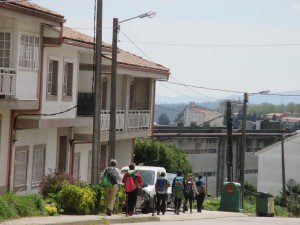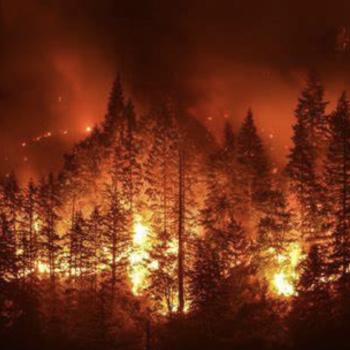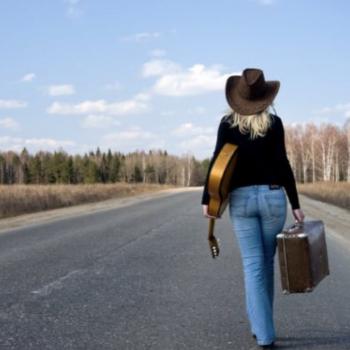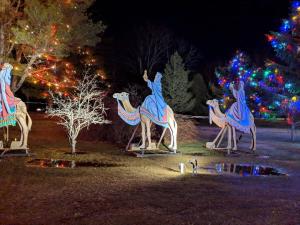
“For as long as humans have walked, they have walked to get closer to their gods.”
The words appear on top of a PBS website in white upon a black background—an over-simplified truth, smacking with arrogant certitude. At least that’s the way it feels to me when I stare at the screen just a few days after returning from pilgrimage on El Camino de Santiago, the Way of St. James, in Northern Spain.
“For as long as humans have walked, they have walked to get closer to their gods.” The phrase rolls over inside of me as I continue to integrate what I experienced while walking along that ancient path, where I felt how faith is mysterious and yet embodied. At some point between the meetings and the laundry and the catching up on email, I find my mind is nodding and expanding the assertion. Yes, we have been walking since forever to grow spiritually. But even more so, we have been walking to survive.
For 200,000 years we’ve been walking. A long distance walk, a pilgrimage on foot; it’s nothing new. It is common to human experience. We walk to find food, to find shelter, to find safety. We walk to escape fire, famine, natural disaster, war. I’m not special for having walked more than 80 miles on one of the routes of El Camino. Many have entered into similar journeys of inevitable suffering with hope for transformation.
The only thing strange about me, perhaps, is that I had the privilege of being able to choose to enter into suffering on purpose in a world where we spend so much energy and money to avoid it.
* * *
Weeks prior to departing for Spain, I am out for one of my practice walks. Crossing gravel and grass, I think of those who walk for survival. Migrants crossing borders all over the world. Refugees fleeing war zones. Families gathering only a few precious belongings, whatever they can carry, and starting off together on foot, crossing deserts, making their way over mountains and along steep cliffs. They travel great distances on foot not because they are seeking adventure and spiritual transformation like I am, but because they want to survive.
A few days later, I stand with other pilgrims preparing for departure in front of a large group of sisters inside our motherhouse. We are Franciscan Sisters of Perpetual Adoration and we are going on this pilgrimage together, in one way or another. Those of us who are going on the physical journey pass the microphone between us and share our anticipation and information.
There’s six in our group, 5 FSPA and 1 friend. We will walk more than 80 miles or 100 kilometers from Ferrol to the Cathedral of Santiago de Compostela in the region of Galicia. We will start on Tuesday of Holy Week and arrive on Holy Saturday. We will carry everything on our backs and use hiking poles. We will walk over hilly terrain and through forests and fields. We will walk between 12 and 18 miles a day.
We answer a combination of practical and spiritual questions from our sisters.
Yes, we will have to carry water. Yes, we will bring a first aid kit. Yes, we are doing this on a fairly low budget; you’d be amazed by the price of the plane tickets we found! Yes, we will pray for you and your intentions.
At one point during the presentation, I start to talk about those who must walk for survival, those who are fleeing war zones and poverty worldwide. I admit to my sisters that I’m aware how privileged I am to be able to fly to Spain to go on pilgrimage; to be in a position where I can choose to walk freely. The uncomfortable feeling of privilege, the awkwardness I experience, I tell them, is part of the tension I will carry with me on pilgrimage. I want to walk in solidarity with those who do not share our privilege and those who suffer because of it.
Later, I send a copy of the pilgrimage prayer I wrote to my community, family and friends. The prayer includes these words:
We carry hope about the future of our shared life.
We carry consciousness that millions around the world must walk to flee war, poverty and oppression
and are in need of safety, strength and peace.
We carry the cross of Christ
as we enter into the Paschal mystery and God’s loving mystery.
A flurry of messages fell into my email inbox before we left for our pilgrimage, a stream of enthusiastic support, promises to pray our Camino prayer with us. I was awed by the connections and the support. Do refugees and migrants around the world also feel the loving support of prayers from others as they go on their journeys?
***
The night before I depart, I’m completing last minute tasks and organizing my gear. At one point, I check the updates on my social media feed and feel my heart sink when I read the horrific news: President Trump ordered the bombing of Syria. I know that the civil war is terribly complex and many Syrians have in fact advocated for U.S. intervention against Assad’s use of chemical weapons. Still, I have an ugly feeling that U.S. bombs will only create more chaos and violence, more suffering.
But en route to Spain, my heart grows distant from the news. I wonder if there’s more trouble, but I’ve elected not to look at news or the internet during this pilgrimage in order to focus on God, so I don’t know. This is going to be a real retreat, a solid time to pray. It doesn’t take long for me to nearly forget the unsteady, sick feelings that surfaced when I learned about the bombing.
Days later, we begin on the Camino Inglés route. As I walk across concrete and over bridges, the gap grows wider between me and the world’s problems. I enter into my very small corner and move my good intention for solidarity to the side. In a foreign land, walking more than ever before in my life, my mind mostly toggles from Where’s the next trail marker? to My feet hurt, my feet hurt to Wow, thanks God, that’s beautiful!
No matter where I go, it seems that I carry my raw human weakness right along with my consciousness.
Each day that I walk to Santiago, I find a rhythm in the energy of endurance, in the pulse of perseverance. Hiking poles swinging, feet moving, my momentum and desire propel me forward. Even with exhaustion and pain tempting me to call it quits, I keep going. I’m motivated partly by shallow realities (it would be embarrassing to not make it all the way to Santiago on foot), but I realize along the way the main thing that keeps me going: Love. Love of God, love of the journey. Love of the rapid increase of wonder and amazement as I encounter more beauty, as I turn around and look back over the miles I’ve walked. My muscles ache and my shoulders pinch from the weight of my pack, but the suffering is just one part of the path. Blisters and blood are normal crosses to carry. Pain is not the end game in this life of faith.
I can imagine—now that I am safe back at my desk in Wisconsin—how there likely were Syrian refugees walking over 5,000 miles southeast of me at the same time I was walking through Spain. My mind can visualize women gripping infants, older children walking along side lugging bags. Dirty shoes. Tired faces. From my own lived-experience of persevering through exhaustion, I can nearly taste the dehydration and dust. My feet quiver for the memory of blistered, hurting feet.
I don’t know what it’s like to be a refugee. I can’t know it. I walked the pilgrimage of El Camino as a person of privilege on a spiritual journey desiring to grow closer to my God. I brought with me my weakness and my shallowness: I so quickly became most focused on my own daily physical experience, rather than connection and solidarity.
But still, I feel a tiny step closer to understanding. Our motives and costs are vastly different, but I share in one essential truth with the refugees who walk for survival and even my pagan ancestors who traveled to meet their gods: love compels me onward, love urges the spirit to keep moving down the road.
Julia Walsh, a Franciscan Sister of Perpeatual Adorations, is on staff at Marywood Franciscan Spirituality Center in northern Wisconsin. She is a Catholic youth minister, a committed social justice activist, and a student at Catholic Theological Union. Her writing has appeared in Global Sisters Report, Living Faith, U.S. Catholic, and Off The Page. Her last post for Sick Pilgrim was “The Broken Body of Christ at the Border.” Visit her online at messyjesusbusiness.com and @juliafspa on Twitter.












